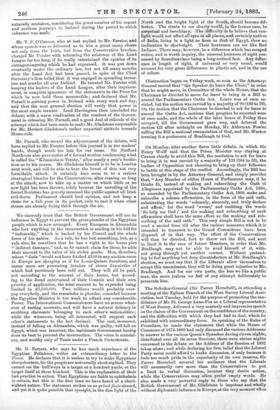Mr. D. Forrest, who says he has much experience of
the Egyptian Fellaheen, writes an extraordinary letter to the Times. He declares that it is useless to try to make Egyptians sharpshooters, for the people are universally short-sighted. They cannot see the bull's-eye in a target at a hundred yards, or the target itself at three hundred. This is the explanation of their bad practice in action. That Egyptians are liable to ophthalmia is certain, but this is the first time we have heard of a short- sighted nation. The statement strikes us as prima' facie absurd, and yet it is quite possible that eyesight, in the dim light of the North and the bright light of the South, should beeome dif- ferent. The strain to see clearly would, in the former ease, be perpetual and hereditary. The difficulty is to believe that sun- light would not affect all eyes in all places, and certainly natives of India, living in a light as keen as that of Egypt, show no inclination to short-sight. Their huntsmen can see like Red Indians. There may, however, be a difference which has escaped notice, and is worth inquiry, the unusual keenness of sight pos- sessed by Scandinavians being a long-noticed fact. Any differ- ence in length of sight, if universal or very usual, would account for very great differences in plastic.art, and in the use of colour.


































 Previous page
Previous page